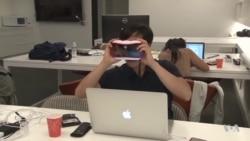Some entrepreneurs who have put their money into technology and startups in California's Silicon Valley are hoping their investments reap big dividends.
Ed Ow is one of those trying to succeed at entrepreneurship through tech.
Ow, who has worked for tech startups in China, is now at a virtual reality startup called Fulldive in Silicon Valley. He says trying to start a business in Asia is much tougher than in Silicon Valley, an area stretching from San Francisco to San Jose in northern California, and home to companies like Apple, Google and Facebook.
"It's a lot harder getting investors, and they are a lot more real in terms of, 'Hey, you have to generate a business model early on and make money early on in order to support yourself,'" said Ow, who described Silicon Valley investors as being more comfortable with risk.
"You have a great idea, great! Go and push it out. We'll invest money into it and figure out the business model along the way," Ow said.
Silicon Valley entrepreneur, angel investor and Vietnamese immigrant Tuoc Luong once worked for a Chinese Internet company. He said risk and failure are viewed differently in Asia, and as a result, influence the ability to secure funding.
"There is more of a stigma related to failure in Asia. Asia puts too much weight on how other people view the perception of you. When you fail, there's a perception that you didn't succeed; but it's worse than that. It affects the parents that say, 'Oh my son didn't succeed.'"
Luong said that in Silicon Valley, failure is not viewed negatively among the investors.
"They (investors) don't avoid people who have failed because they see, okay, they've learned something from that," Luong added.
Even though failure is viewed more positively in Silicon Valley, Tran said it is still rough when it happens, and the startup culture in Silicon Valley is not all glamour.
"There's been a lot of people who go into depression - people who potentially commit suicide. There's a tremendous amount of pressure when it comes to starting your own company. You're tied to something with your ego and your identity," Tran said.
Tran says entrepreneurs from around the world still come and dream of their startup becoming the next Google or Facebook.
"You read about it in the press and that has generated a lot of folks who do want to strike it rich, people who have a gold rush mentality," said Tran.
Many of the entrepreneurs from abroad come with a strong technical knowledge but may not have the interpersonal skills necessary to make a startup successful, said Luong.
"It's your ability to recruit top talent, your ability to get top talent to work together well, your ability to communicate your vision in a way that inspires them, your ability to build a team where the weakest link isn't so weak," said Luong.
Silicon Valley investors are not only looking for these skills of success in the United States.
"There are parts of the world that are developing outside of Silicon Valley that are matching it in terms of drive and innovation, and we're starting to see that in parts of China," Tran said.
It is not only in China. Tran said potential in Southeast Asia is getting the attention of Silicon Valley investors.
"It's the fastest growing region in the world. You have 620 million people who have skipped broadband and have gone on mobile."
On the flip side, investors from China are looking eastward.
"They come to the States, and they invest a lot around this area and they bring it back to China, and they encourage people in China to actually innovate also," said Ow.
Silicon Valley may be the spark, but the culture of innovation and entrepreneurship will continue to grow throughout Asia and the world as technology spreads and evolves.












